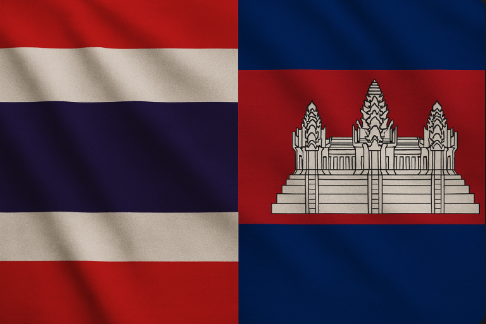BANGKOK — The government of Thailand announced on Tuesday that it is suspending implementation of the recently signed cease-fire accord with neighbouring Cambodia after a landmine explosion injured four Thai soldiers in Sisaket Province along the contested border.
The agreement, reached less than three weeks ago at a summit in Malaysia under the mediation of the Donald Trump administration and regional partners, had committed both nations to withdraw heavy weapons, begin land-mine clearance and release prisoners of war.
Why Thailand halted the deal
Thailand’s Defence Minister Nattaphon Narkphanit stated that “we suspend all terms of the implementations in the joint declaration and … suspend the release of prisoners of war to Cambodia.”
Prime Minister Anutin Charnvirakul, who assumed office in September, said the landmine blast indicated that the security situation had not improved as required under the accord, and therefore Thailand could not proceed with further steps.
Thailand accuses Cambodia of having laid new landmines along the border—despite the agreement, which required both sides to clear mines and withdraw arms. Cambodia’s defence ministry rejects this claim, saying it remains committed to de-escalation and that many unexploded bombs are legacy ordnance from past conflicts.
Background of the conflict
The current crisis followed a short but deadly clash in July that killed dozens and displaced hundreds of thousands of civilians along the Thai-Cambodian frontier. The October accord — often referred to as the “Kuala Lumpur Peace Accord” — was signed at the 47th Association of Southeast Asian Nations (ASEAN) summit in Malaysia, in the presence of Trump and Malaysian Prime Minister Anwar Ibrahim.
Impact on tourism and travel
Tourism in the border region has been hit hard. Thai authorities report hotel bookings in provinces such as Ubon Ratchathani, Si Saket and Sa Kaeo have collapsed by as much as 80–100 % since tensions escalated in May.
For travellers, most of Thailand remains safe, including major destinations such as Bangkok, Phuket and Chiang Mai, but border areas are under active caution. The Tourism Authority of Thailand (TAT) confirms travel in the country remains largely unaffected, while security measures remain in place in seven provinces along the Cambodian frontier.
Critically: border crossings in the provinces along the Cambodia border — especially the Sisaket–Cambodia border region — are the main affected zones. Travel and tourist traffic in other parts of Thailand and Cambodia that are distant from the disputed frontier remain largely operational. However, foreign government advisories caution against non-essential travel in the border zones.
Government responses & next steps
Behind the scenes, both governments have committed initially to implementation of the peace deal: heavy-weapon withdrawals have already begun, and joint mine-clearance operations were due to start. The Thai side announced efforts in 13 zones, Cambodia in one.
With the suspension, however, Thailand is pausing the planned release of 18 Cambodian detainees under the accord and will reassess Cambodian adherence before re-engaging. Cambodia, for its part, called the Thai decision “regrettable” and urged dialogue but reiterated that many mines were legacy devices and not recently planted.
Both sides are expected to return to diplomatic talks—mediator Malaysia and the United States remain on standby. ASEAN observers may be invited to monitor the border and the de-mining process. The failure to follow through threatens a deeper breakdown of the truce and could reverberate through regional security and trade.
What this means moving forward
At present:
- Tourist travel into the affected border region should be treated with caution; crossing points near Sisaket and Ubon Ratchathani remain insecure.
- Other tourist routes — the major cities, islands and inland destinations — are not directly impacted by the border standoff and remain open, albeit with advice to stay informed.
- For cross-border travel between Thailand and Cambodia via land, restrictions and closures continue to hamper visa-runs and routine crossings.
- The prospects of lasting peace hinge on full implementation of mine-clearance, heavy-weapons withdrawal and trust-building mechanisms. The current setback means these efforts will be put on hold until both sides resume cooperation.
In short: after much-lauded diplomacy centring on President Trump’s involvement, the peace process between Thailand and Cambodia now faces a fresh crisis. The landmine incident has brought the truce to a halt — and unless both capitals find a path back to engagement, the fragile accord may unravel. (hb)

